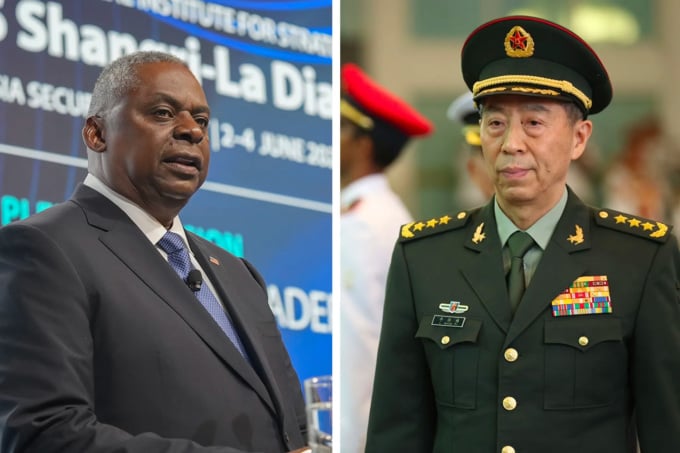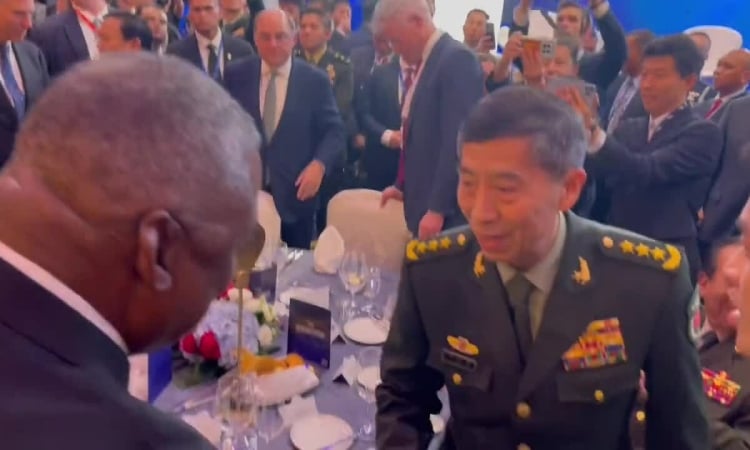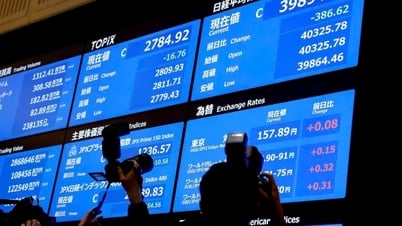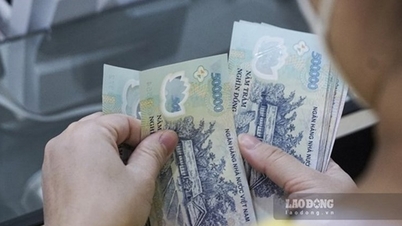Meeting at the Shangri-La Dialogue, US and Chinese officials failed to resolve their differences and even saw relations decline further.
The Shangri-La Dialogue in Singapore last weekend was seen as an opportunity for countries, especially the US and China, to discuss each other's security concerns and find ways to improve relations, as tensions have been rising steadily over the past year. However, what happened instead were criticisms from US and Chinese defense leaders, making the confrontation even more tense.
In the run-up to the Shangri-La Dialogue, flashpoints have flared across the region. In late May, a Chinese fighter jet was accused of “unnecessarily aggressive behavior” when it approached and intercepted a US reconnaissance plane operating over the South China Sea. Over the weekend, as US Defense Secretary Lloyd Austin called on Beijing to resume defense dialogue with Washington, a Chinese warship crossed the Taiwan Strait, nearly colliding with a US destroyer.
Defense Secretary Austin and his Chinese counterpart Li Shangfu did not hold any private meetings on the sidelines of the Shangri-La Dialogue, beyond a handshake and a brief greeting before dinner on June 2. Tensions between the two countries overshadowed the discussions.
“A friendly handshake at dinner is no substitute for real commitment,” Mr. Austin admitted on June 3.
US Secretary of Defense Lloyd Austin shook hands and briefly spoke with Chinese Defense Minister Li Shangfu at the opening ceremony of the Shangri-La Dialogue 2023 in Singapore on the evening of June 2. Video : Twitter/Yaroslav Trofimov
In a speech on the evening of June 2, Australian Prime Minister Anthony Albanese said he was concerned that a "breakdown" in the US-China dialogue could trigger a chain reaction that would have "terrible consequences for the world ". General Yoshihide Yoshida, chief of staff of Japan's Self-Defense Forces, warned that the international community was at a "turning point" with the specter of war looming over Asia. The next day, Indonesian Defense Minister Prabowo Subianto mentioned "the risk of an impending disaster".
In separate speeches, both Mr. Austin and Mr. Lee emphasized their desire to avoid conflict and promote stability. However, they also sent messages of caution to each other.
“We do not seek conflict or confrontation, but we will not back down in the face of bullying or coercion,” said Lloyd Austin, who complained about the “hegemonic” ambitions of a major power he did not name.
The US defence secretary said Washington was not trying to create a new NATO in Asia through deepening partnerships with some regional powers. China's defence minister warned that efforts to establish NATO-like alliances would push Asia into a "spiral of dispute and conflict".
According to Ishaan Tharoor, a foreign affairs commentator for the Washington Post, most delegates attending the Shangri-La Dialogue responded to Mr. Austin's statements, as he seemed to want to cool down tensions at this time.
During the dialogue session on the morning of June 3, Mr. Austin emphasized that the US does not want to change the status quo around Taiwan, an island that Beijing considers part of its territory, and said that the US believes conflict in the region "is not imminent or inevitable."
He also called on Beijing to engage in more substantive dialogue with Washington. “The more we communicate, the more we can avoid misunderstandings and miscalculations that could lead to crisis and conflict,” he said.
Bec Shrimpton, director of defense and national security strategy at the Australian Strategic Policy Institute, said the US defense secretary had delivered a “strong speech with direct and indirect messages to China.” Shrimpton said Austin had made it clear that “the US is ready to pick up the phone and talk,” but also reminded Beijing that it has enough influence and power to compete in any area it chooses.
Mr. Lee took the stage the next day, offering a blunt rebuttal to Mr. Austin’s message. After Mr. Austin mentioned America’s “protection of the international order,” Mr. Lee said that “the so-called rules-based international order never tells you what the rules are and who created them.”
Observers say that according to Mr. Ly, China is the country that protects regional norms and stability, while the US is the one that intervenes.
Referring to Taiwan, China's defense minister criticized the island's government for inciting "separatist activities" and declared that Taiwan would definitely "return to the mainland." Commenting on the near-collision incident in the Taiwan Strait, Mr. Li said that the passage of US and allied naval vessels through this strategic sea route was not "innocent passage" and was an act of causing tension.
"What's the benefit of going there? We Chinese often say 'don't poke your nose into other people's business'," Mr. Li said.
The Chinese defense minister’s harsh tone has drawn a backlash. Jay Tristan Tarriela, deputy commander of the Philippine Coast Guard, criticized Mr. Li’s message, citing China’s recent actions in the South China Sea.
“Mr Lee talked about mutual respect, restraint and resistance to hegemony. It was a lot more mixed than the kaya toast I had for breakfast yesterday,” said Collin Koh, a research fellow at Singapore’s S. Rajaratnam School of International Studies, referring to the island nation’s popular coconut milk, pandan and custard dish.
"I have attended the Shangri-La Dialogue for over a decade and have seen successive Chinese defense ministers become increasingly assertive, but Mr. Lee's message was the toughest yet. We often hear about China's charm offensive, but this speech was not charming," said Michael Fullilove, executive director of the Lowy Institute in Australia.
Ankit Panda, a researcher at the Carnegie Endowment for International Peace , said the implication in Mr Lee's speech was that China believes "the US is fundamentally not a power in Asia and should therefore abandon its presence in the region". He said the Shangri-La confrontation "could become the new normal as US-China relations sink to a new low".
“Both countries will use forums like this to talk about competitive issues and share their vision for regional security,” he said.

US Secretary of Defense Lloyd Austin (left) and Chinese Defense Minister Li Shangfu. Photo: AP
Mark Esper, former US Secretary of Defense, said that the lack of dialogue between the US and China is a barrier preventing the two sides from establishing a crisis management mechanism.
He cited that when a US drone collided with a Russian fighter jet over the Black Sea in March, Mr. Austin spoke to his Russian counterpart, Sergei Shoigu, immediately afterward. However, when the US shot down a Chinese balloon off the coast of South Carolina in early February, China declined Mr. Austin’s request for a phone call.
"We have long had a channel of communication between the Russian and American leaders at the military and civilian levels. This communication mechanism was established decades ago. But we do not have that with China," he said.
US President Joe Biden recently shared the idea of an early thaw in US-China relations. However, that scenario is unlikely to happen in the near future because China believes the terms of dialogue are unfavorable to them, according to Ivy Kwek, a researcher at the Global Crisis Group.
Ms. Kwek added that this is a concern for the region because the vast majority of Asian countries see strategic competition between the US and China as potentially destabilizing.
"No one in Asia wants to live in the shadow of the giants. They all want to enjoy the sunshine," said expert Fullilove.
Thanh Tam (According to Washington Post, Nikkei Asia )
Source link



![[Photo] General Secretary To Lam, Secretary of the Central Military Commission attends the 12th Party Congress of the Army](https://vphoto.vietnam.vn/thumb/1200x675/vietnam/resource/IMAGE/2025/9/30/9b63aaa37ddb472ead84e3870a8ae825)

![[Photo] Panorama of the cable-stayed bridge, the final bottleneck of the Ben Luc-Long Thanh expressway](https://vphoto.vietnam.vn/thumb/1200x675/vietnam/resource/IMAGE/2025/9/30/391fdf21025541d6b2f092e49a17243f)
![[Photo] President Luong Cuong receives President of the Cuban National Assembly Esteban Lazo Hernandez](https://vphoto.vietnam.vn/thumb/1200x675/vietnam/resource/IMAGE/2025/9/30/4d38932911c24f6ea1936252bd5427fa)
![[Photo] The 1st Congress of Phu Tho Provincial Party Committee, term 2025-2030](https://vphoto.vietnam.vn/thumb/1200x675/vietnam/resource/IMAGE/2025/9/30/1507da06216649bba8a1ce6251816820)
![[Photo] Solemn opening of the 12th Military Party Congress for the 2025-2030 term](https://vphoto.vietnam.vn/thumb/1200x675/vietnam/resource/IMAGE/2025/9/30/2cd383b3130d41a1a4b5ace0d5eb989d)


































































































Comment (0)